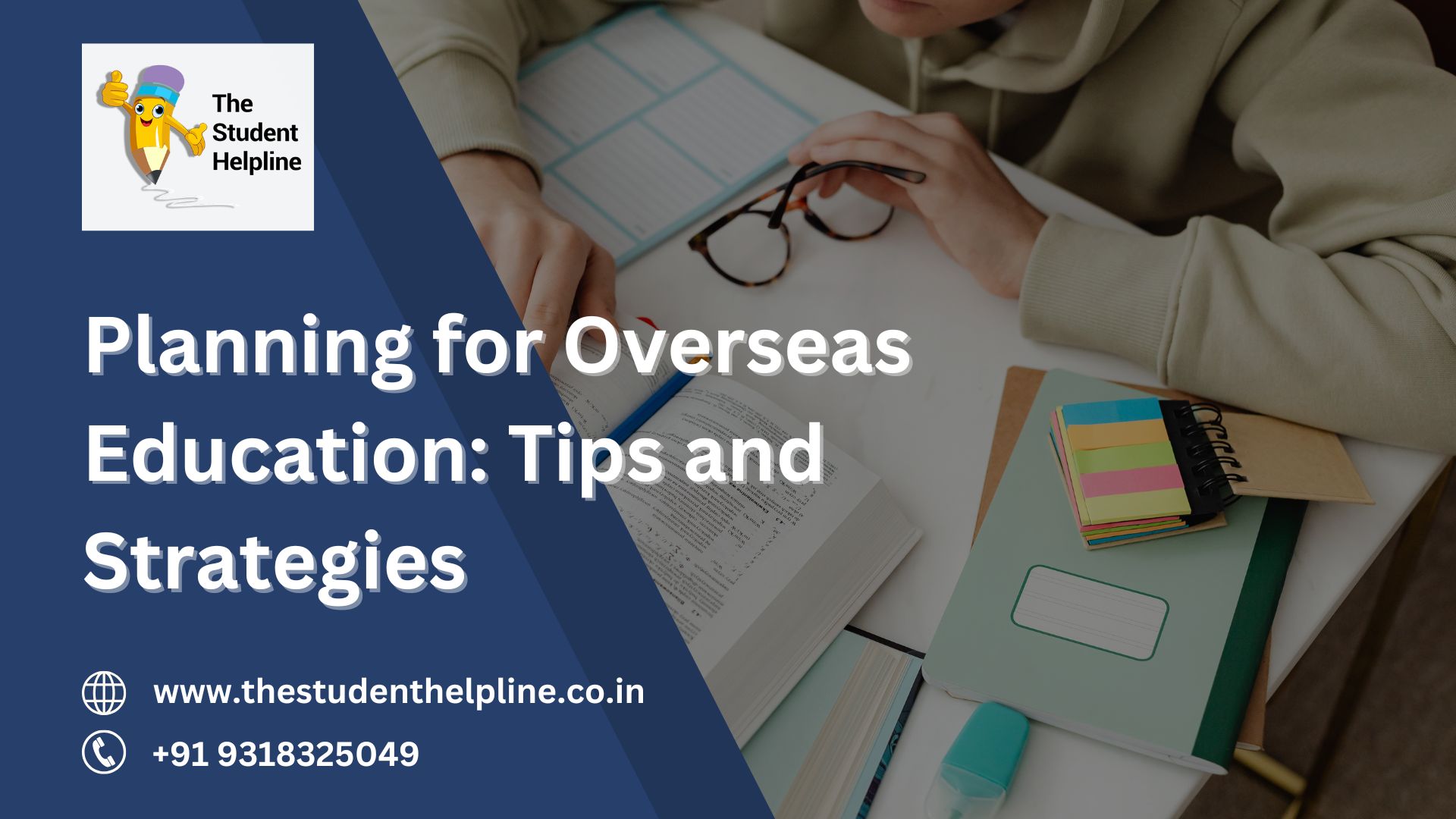Planning for overseas education is a life-changing experience that requires careful consideration and strategic planning. With the world offering a myriad of academic opportunities, students have the chance to enhance their academic journey, explore new cultures, and gain invaluable global perspectives. Whether you are looking to study in the UK, the USA, or any other destination, thorough preparation can make your overseas education journey smoother and more successful.
In this guide, we will provide essential tips and strategies to help you plan your overseas education effectively. We’ll also highlight the role of a study abroad consultant, such as The Student Helpline, in guiding you through the process.
Why Overseas Education?
The Global Experience
One of the most significant advantages of studying abroad is the opportunity to immerse yourself in a new culture. This experience broadens your understanding of global perspectives, enhances cross-cultural communication skills, and boosts personal growth. Whether it’s experiencing the rich history of Europe, the technological advancements in the USA, or the multicultural environment in the UK, studying abroad offers experiences that go beyond academic knowledge.
Academic Opportunities
Overseas education opens doors to world-class institutions and academic programs that may not be available in your home country. For example, if you wish to study in the UK, you’ll have access to renowned universities such as Oxford, Cambridge, and Imperial College London, which offer cutting-edge programs and research opportunities. Global education also allows you to specialize in niche areas, enhancing your career prospects in competitive industries.
The Role of a Study Abroad Consultant
Planning for overseas education can be a daunting process, involving several steps like choosing the right course, university, and destination, securing scholarships, obtaining a visa, and preparing for life in a new country. This is where a study abroad consultant comes in. A reliable consultant, such as The Student Helpline, offers personalized guidance tailored to your academic goals and financial situation, ensuring a seamless transition from home to your study destination.
Benefits of Using a Study Abroad Consultant
1. Expertise and Knowledge
Study abroad consultants possess extensive knowledge of the global education system, university application processes, and visa requirements. Their expertise can help you make informed decisions when selecting universities and courses that align with your academic and career goals.
2. Simplifying the Application Process
Navigating the university application process can be complex, with different countries and institutions having varying requirements. The Student Helpline helps students by streamlining the process, ensuring that all documents are correctly prepared and submitted on time. This minimizes the risk of application rejections due to incomplete or incorrect information.
3. Visa Assistance
Securing a student visa is one of the most critical steps in planning for overseas education. Consultants help students navigate visa application processes, providing guidance on required documents, visa interviews, and embassy procedures. Their insights significantly improve your chances of obtaining a visa in a timely manner.
4. Financial Guidance
Financing your overseas education can be a significant concern. A good study abroad consultant helps you explore various financial aid options, scholarships, and student loans to make your education affordable. They also assist in managing living expenses and finding part-time work opportunities in your destination country.
Tips and Strategies for Planning Overseas Education
1. Choose the Right Course and University
The first step in planning your overseas education is selecting the right course and university that aligns with your academic interests and career aspirations. Research various universities, their rankings, the curriculum offered, faculty expertise, and campus facilities.
Factors to Consider:
- University Reputation: Some institutions are globally recognized for specific fields. For example, if you’re interested in engineering or business, the UK offers top-ranked programs in these areas.
- Program Curriculum: Review the course structure and ensure it aligns with your career goals.
- Location: Consider whether you want to study in a bustling city or a quieter town. The cultural and social environment plays a crucial role in your overall experience.
If you feel overwhelmed, a study abroad consultant can provide personalized recommendations based on your interests.
2. Plan Your Budget
Studying abroad can be expensive, and it’s essential to plan your finances well in advance. Tuition fees, accommodation, travel, and living expenses vary depending on the destination and institution.
Budget Breakdown:
- Tuition Fees: Research the cost of your program and any available scholarships or financial aid.
- Living Expenses: Consider accommodation, food, transport, health insurance, and other daily expenses.
- Miscellaneous Costs: These can include study materials, social activities, and travel within the country.
Consulting with The Student Helpline can help you explore scholarship opportunities, identify part-time job options, and understand the cost of living in different regions.
3. Research Scholarships and Financial Aid
Many students hesitate to pursue overseas education due to the perceived cost. However, numerous scholarships and financial aid options are available to international students. Whether you’re planning to study in UK or elsewhere, research scholarship programs offered by universities, governments, and private organizations.
Scholarship Opportunities:
- Merit-Based Scholarships: Awarded to students based on academic performance or extracurricular achievements.
- Need-Based Scholarships: Offered to students from low-income backgrounds.
- Destination-Specific Scholarships: Some countries, like the UK, offer scholarships to students from specific regions.
A study abroad consultant can guide you in identifying the best scholarships and ensuring you meet the eligibility criteria.
4. Prepare for Standardized Tests
Many universities require standardized tests such as the IELTS, TOEFL, GRE, or GMAT for admission. Preparing for these exams early is essential, as they play a crucial role in the admission process.
Tips for Test Preparation:
- Start Early: Give yourself enough time to prepare thoroughly. It’s advisable to start at least six months before your test date.
- Enroll in Preparation Courses: Many consultants, including The Student Helpline, offer coaching and preparation courses to help you achieve the required scores.
- Practice Regularly: Take mock tests to familiarize yourself with the format and time constraints of the exam.
5. Understand the Visa Process
Obtaining a student visa is a crucial part of planning for overseas education. The process varies depending on your destination, and it’s essential to understand the specific requirements of the country you plan to study in.
Key Steps in the Visa Process:
- Gather Documentation: Ensure that you have all the necessary documents, such as your admission letter, proof of financial stability, and passport.
- Attend Visa Interviews: Some countries, like the USA, require you to attend a visa interview. Be prepared to answer questions about your study plans and intentions after completing your course.
- Follow-Up: Track the progress of your visa application and address any additional requests promptly.
The Student Helpline provides assistance throughout the visa application process, ensuring that you meet all requirements and deadlines.
6. Prepare for Life Abroad
Once you’ve secured admission and your visa, it’s time to prepare for life in a new country. Moving abroad can be both exciting and challenging, so proper preparation is key to making a smooth transition.
Cultural Adjustment:
- Learn About the Culture: Familiarize yourself with the local culture, customs, and etiquette. This will help you avoid culture shock and integrate more easily into your new environment.
- Language Skills: If you’re going to study in the UK, having strong English language skills is essential. However, if you’re heading to a non-English speaking country, learning the local language will enhance your experience.
Accommodation:
- University Housing: Many universities offer on-campus housing, which is a convenient option for international students.
- Private Accommodation: If you prefer more independence, you can look for private apartments or shared housing.
Health and Safety:
- Health Insurance: Ensure that you have comprehensive health insurance coverage that meets the requirements of your destination country.
- Safety: Research the safety of your destination and take precautions to stay safe in your new environment.
7. Build a Support System
Studying abroad can sometimes feel overwhelming, especially when you’re far from home. Building a support system will help you navigate challenges and enjoy your experience.
Ways to Build a Support System:
- Connect with Other International Students: Join student organizations and cultural clubs to meet like-minded individuals.
- Stay in Touch with Family and Friends: Regular communication with your loved ones will provide emotional support and ease homesickness.
- Seek Help When Needed: Don’t hesitate to ask for help from university counselors or your study abroad consultant if you’re facing difficulties.
8. Maximize Your Overseas Education Experience
Your time abroad is an opportunity to grow academically, personally, and professionally. Make the most of this experience by stepping out of your comfort zone and embracing every opportunity that comes your way.
Tips for Maximizing Your Experience:
- Network with Professors and Peers: Building connections can open doors to internships, research opportunities, and future job prospects.
- Explore the Local Culture: Traveling and participating in local cultural events will enrich your understanding of the world and make your study abroad experience memorable.
- Pursue Internships: Many countries, including the UK, allow international students to take part in internships during or after their studies, enhancing your career prospects.
Conclusion
Planning for overseas education requires careful thought, preparation, and the right guidance. By following the tips and strategies outlined in this guide, you can ensure that your study abroad experience is both rewarding and successful. Partnering with a trusted study abroad consultant, such as The Student Helpline, can simplify the process and provide you with the support needed to achieve your academic and career goals.
Whether you plan to study in the UK or explore opportunities in other countries, the journey of overseas education is an investment in your future. With the right approach, you can unlock a world of possibilities and shape your career on the global stage.
FAQs
What is the first step in planning for overseas education?
The first step is to choose the right course and university that aligns with your academic and career goals.
How can a study abroad consultant help me?
A study abroad consultant helps by providing expert guidance on university selection, application processes, visa assistance, and financial planning.
Are there scholarships available for international students?
Yes, there are numerous scholarships available, including merit-based, need-based, and destination-specific scholarships.
What standardized tests are required for studying abroad?
Common tests include the IELTS, TOEFL, GRE, and GMAT, depending on the university and program.
How can I prepare for life abroad?
Prepare by learning about the local culture, arranging accommodation, securing health insurance, and building a support system.






